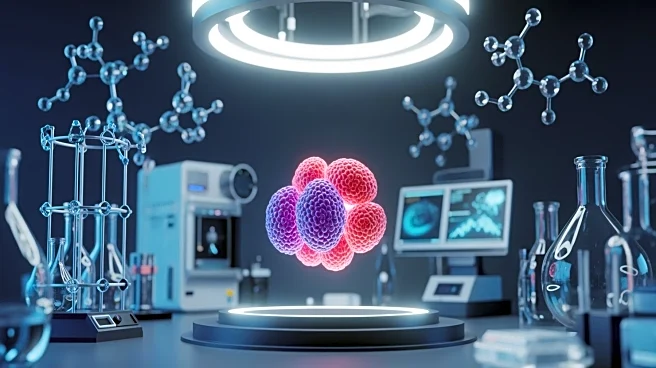What's Happening?
Tolerance Bio, a biopharmaceutical company, has announced a breakthrough in cancer treatment using iPSC-derived thymic organoids. The research, published in Cancer Research Communications, demonstrates that these organoids can educate human T cells in vivo,
leading to delayed melanoma tumor growth in a patient-derived xenograft model. The study was conducted by Antonio Jimeno, M.D., Ph.D., from the University of Colorado Anschutz School of Medicine, and Holger A. Russ, Ph.D., from the University of Florida, Gainesville. The approach involves implanting patient-derived thymic cells into humanized immune-deficient mice, which are then matched with tumor tissues from a melanoma patient. Results showed slower tumor growth and decreased viable melanoma content in mice with thymic organoids, attributed to increased intra-tumoral activated T-cells. This innovative model aims to improve personalized medicine by testing immune therapies tailored to individual patients.
Why It's Important?
The development of iPSC-derived thymic organoids represents a significant advancement in oncology, offering potential therapeutic and diagnostic benefits. By enabling more effective T-cell education and tumor clearance, this approach could lead to improved cancer treatments and personalized medicine strategies. The ability to reconstitute a T cell immune system in vivo with beneficial outcomes could revolutionize how immune therapies are developed and applied, potentially increasing their efficacy and reducing side effects. This research also supports the development of new drug candidates and vaccines, enhancing the precision of cancer treatment and potentially improving patient outcomes.
What's Next?
Tolerance Bio plans to advance towards clinical applications by developing a robust manufacturing process for their iPSC thymic cell product. The company intends to initiate pre-investigational new drug (IND) studies, aiming to bring this innovative treatment closer to clinical use. As the research progresses, collaboration with leading academic institutions like the University of Colorado and the University of Florida will continue to play a crucial role in refining and expanding the application of thymic organoids in cancer therapy. The success of these studies could pave the way for broader use of iPSC-derived cells in treating various immune-mediated diseases.
Beyond the Headlines
The use of iPSC-derived thymic organoids not only offers a promising avenue for cancer treatment but also raises important ethical and regulatory considerations. As this technology moves towards clinical application, questions regarding the safety, efficacy, and ethical implications of manipulating human immune systems will need to be addressed. Additionally, the potential for personalized medicine to transform healthcare delivery could lead to shifts in how treatments are developed, tested, and administered, emphasizing the need for robust regulatory frameworks to ensure patient safety and equitable access.















